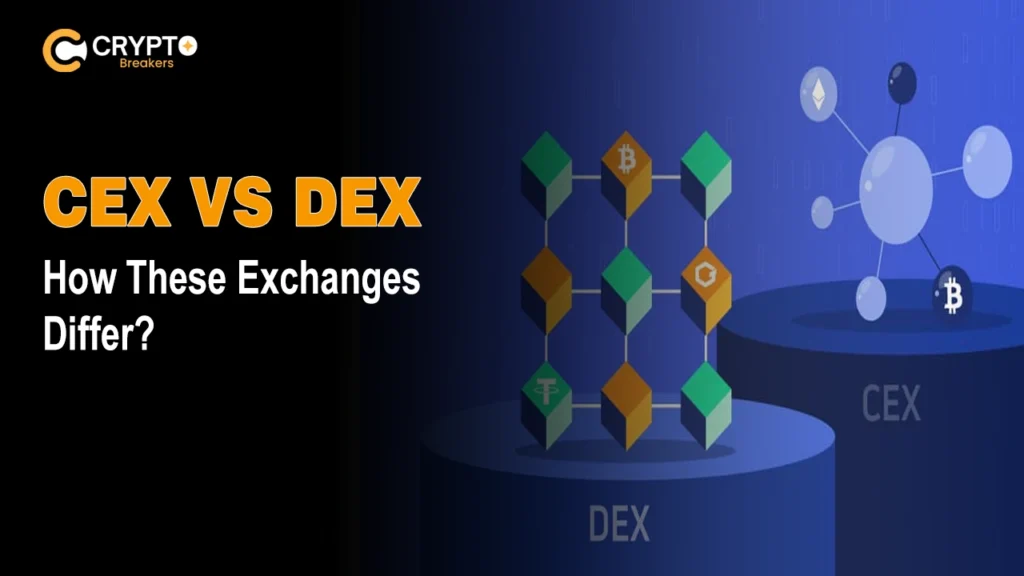This question confuses countless crypto traders, especially beginners stepping into the world of digital assets. Both centralized (CEX) and decentralized (DEX) exchanges let you buy, sell, and trade cryptocurrencies, yet they operate in completely different ways.
While CEXs offer ease of use and regulated environments, DEXs provide more privacy and control over your funds.
In this article, you’ll clearly understand what CEXs and DEXs are, how they differ, and which one better fits your trading goals. Ready to dive in? Let’s begin!
What Is CEX: Overview And Examples

A centralized exchange (CEX) is an online platform where overall crypto transactions are facilitated and managed by a privately held company and groups of entities. These exchanges operate under KYC and AML, ensuring they are secure and you trade cryptocurrencies under legal authorities.
After this short overview, I would like to introduce some popular centralized exchanges. Ok! Rotate your head toward the section below.
Some Popular Centralized Exchanges
Here are 4 popular CEXs for crypto traders.
- Binance: When it comes to trading cryptocurrencies, Binance has its special place. This CEX, with its user-friendly interface and other features, stands out as one of the ideal choices.
- Coinbase: Another centralized platform that is used to buy Bitcoin and other popular cryptocurrencies. It is often compared with Bitcoin, and according to many traders, it is the best among all.
- Kraken: An online platform that enables 24/7 trading of cryptocurrencies and offers traders a secure way to buy and sell coins is called Kraken.
- KuCoin: KuCoin is one of the biggest names in the world of crypto. It’s an online platform that offers a wide range of features, including lower gas fees, multiple coin selections, and others.
What Is DEX: Overview And Examples

A decentralized exchange (DEX) is a platform that allows traders and investors to buy, sell, swap, and even stake their assets without relying on third-party intermediaries. Short saying: These exchanges are free of the control of any company or group of entities. Furthermore, all transactions are facilitated directly on blockchain networks.
Unlike the previous section, I will briefly discuss some common examples of decentralized exchanges.
Some Popular Decentralized Exchanges
This brief section will explore the top 4 CEXs.
- Uniswap: The role Uniswap has played in the crypto world is worth being written with golden words. This decentralized exchange is built on the Ethereum blockchain, and traders use it to swap tokens and coins.
- PancakeSwap: Readers! The same DEX about which I have already hinted in the introduction of this post. This decentralized platform lets you easily buy and sell a wide range of crypto assets.
- Curve Finance: Curve Finance is an ideal choice for those traders who want to earn passive income and rewards through their crypto assets.
- SushiSwap: Unlike Uniswap, this exchange is also built on the Ethereum blockchain. SushiSwap allows traders to provide liquidity to the DeFi pool as well as trade a wide range of tokens and coins.
CEX vs DEX: Which Exchange Is Better?
At last, that section has come for which most of you would be eagerly waiting. Right? In this cornerstone part, I will explore some factors that will help you know which exchange suits your trading needs.
Hoping, after my long discussion, you will never be stuck in solving this CEX vs DEX puzzle.
1. Control Over Funds
I found it better to begin this CEX vs DEX comparison with this factor. Let’s take a detailed look.
CEX:
I already mentioned in the overview that CEXs are run by central authorities. It means all the funds you trade remain under the control of these authorities or exchanges you use. To access your crypto assets, you have to rely on the exchange’s policies and regulations.
DEX:
On the other side, when you use such a DEX, you have full control over your funds. This is because they are free from the company’s rules and policies. When using them for trading, you can easily access your coins and tokens whenever you desire or need.
Verdict:
Here, I don’t need to announce the winner, as you would already have understood that DEXs provide you with greater authority over your funds.
2. Security
Where there is higher security, there is users’ trust. Right? Now, it’s important to know whether a centralized or a decentralized exchange offers high levels of security.
CEX:
Readers! If you are thinking that just because of being controlled by companies, these exchanges are 100% secure, you are thinking wrong. Although the companies (managing the DEXs) ensure extra layers of security, they are still more prone to cyber attacks and hacks.
DEX:
However, traders can use these online platforms for crypto trading without worrying about such attacks. You get an opportunity to trade cryptocurrencies in an environment that is at least 100 miles away from criminals. “Your control, secure trading.”
Verdict:
This time, once again, the winner is a decentralized exchange due to its ability to add extra layers of security.
3. Ease of Use
If any device is difficult to use, will you hold it for a long time? We don’t think so. So, it’s time to see which one (CEX vs DEX) suits your needs concerning this factor.
CEX:
Here’s a good thing: These exchanges are designed to be beginner-friendly. Whether you are a beginner or an expert, you can easily use them. No technical skills or setup are required to start trading.
DEX:
Despite providing you with full control over assets, these platforms require you to have technical skills for trading. For example, if you want to swap tokens on Uniswap, you will first connect your crypto wallet with it and then start trading, making it difficult to manage funds, especially for beginners.
Verdict:
This time, I am confident in declaring CEX the winner, as they are easy to navigate and use.
4. Transaction Speed
This CEX vs DEX war is going to intensify, as I have brought one of the most notable factors, “Transaction Speed.” Let’s explain in detail.
CEX:
I can confidently say that using CEXs, traders will never complain about transaction delays. Wondering why? The reason is that these platforms can easily manage all transactions without settling each of them on a separate blockchain. Such faster transactions ensure a smooth trading experience, making CEXs speed-friendly for traders.
DEX:
Unfortunately, these decentralized platforms can’t ensure faster transactions.
Reason: All transactions are facilitated on different blockchains, increasing the time of settlement.
Readers! Another reason for transaction delays can be the network’s lower capacity during higher demand, which disappoints traders who expect quick transaction executions.
Verdict:
I say congratulations to CEXs for defeating DEXs and winning the crown.
5. Trading Fees
Everyone in the crypto market wants better performance, but with lower trading fees. Let’s compare CEX vs DEX.
CEX:
These exchanges charge 0.1% to 0.5% trading fee per trade. However, this fee depends on several factors. Some of these are:
- Trading Volume
- Order Types
- Market Conditions
- Trading Types
- Network Fees
- Network Congestion
Due to these factors, the trading fee can vary significantly (from higher to lower or from lower to higher).
DEX:
Compared to CEXs, these exchanges demand lower trading fees, as they cut out intermediaries and execute transactions directly on blockchains. However, this trading fee can fluctuate, depending on the network gas fee and trading volume as well.
Verdict:
In my opinion, if it comes to trading fees, this CEX vs DEX match should be a tie. Both centralized and decentralized platforms offer trading fees that can be higher or lower based on multiple factors. However, this choice can also depend on the trader’s budget.
CEX vs DEX: Have A Quick Comparison

For readers who don’t want to go through my entire discussion, I have curated this comparison table as a quick summary.
| Factors | Centralized Exchanges | Decentralized Exchanges |
| Control over funds | Controlled by exchanges themselves. | You have full control over funds. |
| Security | Less Secure Platforms. | Highly Secure (ensure higher security). |
| Ease of Use | Very easy to navigate and use. | Require technical skills for trading. |
| Transaction Speed | No complaint about transaction delays | Don’t ensure faster transactions. |
| Trading Fees | Can be lower and higher (depending on multiple factors). | Usually lower than CEXs, but it depends on the network’s congestion. |
Conclusion:
Both centralized (CEX) and decentralized (DEX) exchanges play vital roles in shaping the crypto trading ecosystem. While CEXs offer simplicity, speed, and strong liquidity, DEXs stand out for privacy, control, and enhanced security. The right choice depends on your trading goals and comfort level. Beginners may find CEXs more user-friendly, while experienced traders might prefer the independence of DEXs.
Ultimately, understanding the strengths and limitations of both ensures smarter, safer, and more confident crypto trading decisions in today’s evolving digital market.


